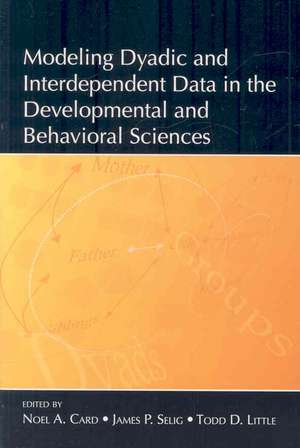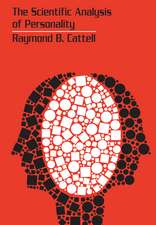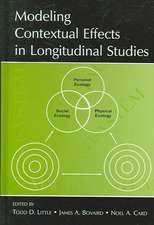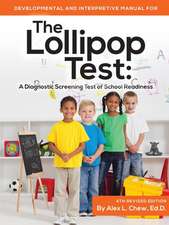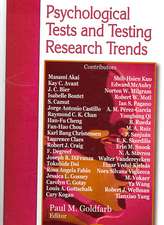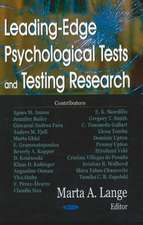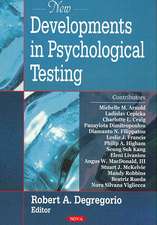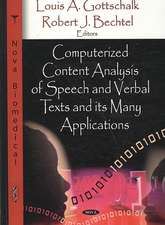Modeling Dyadic and Interdependent Data in the Developmental and Behavioral Sciences
Editat de Noel A. Card, James P. Selig, Todd Littleen Limba Engleză Paperback – 10 iul 2008
Many contributors are innovators of the techniques and all are able to clearly explain the methodologies and their practical problems including issues of measurement, missing data, power and sample size, and the specific limitations of each method.
Featuring a balance between analytic strategies and applications, the book addresses:
- The Actor-Partner Interdependence Model for analyzing influence between two individuals
- The Intraclass Correlational Approach for analyzing distinguishable roles (parent-child) or exchangeable (same-sex) dyadic data
- The Social Relations Model for analyzing group interdependency
- Social Network Analysis approaches for relationships between individuals
| Toate formatele și edițiile | Preț | Express |
|---|---|---|
| Paperback (1) | 494.99 lei 6-8 săpt. | |
| Taylor & Francis – 10 iul 2008 | 494.99 lei 6-8 săpt. | |
| Hardback (1) | 1010.53 lei 6-8 săpt. | |
| Taylor & Francis – 9 iul 2008 | 1010.53 lei 6-8 săpt. |
Preț: 494.99 lei
Preț vechi: 582.34 lei
-15% Nou
Puncte Express: 742
Preț estimativ în valută:
94.72€ • 101.28$ • 78.97£
94.72€ • 101.28$ • 78.97£
Carte tipărită la comandă
Livrare economică 18 aprilie-02 mai
Preluare comenzi: 021 569.72.76
Specificații
ISBN-13: 9780805859737
ISBN-10: 080585973X
Pagini: 460
Dimensiuni: 152 x 229 x 25 mm
Greutate: 0.61 kg
Ediția:1
Editura: Taylor & Francis
Colecția Routledge
Locul publicării:Oxford, United Kingdom
ISBN-10: 080585973X
Pagini: 460
Dimensiuni: 152 x 229 x 25 mm
Greutate: 0.61 kg
Ediția:1
Editura: Taylor & Francis
Colecția Routledge
Locul publicării:Oxford, United Kingdom
Cuprins
N.A. Card, T.D. Little, J.P. Selig, Modeling Dyadic and Interdependent Data in Developmental Research: An Introduction. B. Laursen, D. Popp, W.J. Burk, M. Kerr, H. Stattin, Incorporating Interdependence into Developmental Research: Examples from the Study of Homophily and Homogeneity. W.L. Cook, Application of the Social Relations Model Formulas to Developmental Research. A.H.N. Cillessen, C. Borch, Analyzing Social Networks in Adolescence. N. Ram, A.B. Pedersen, Dyadic Models Emerging from the Longitudinal Structural Equation Modeling Tradition: Parallels with Ecological Models of Interspecific Interactions. E. Ferrer, K.F. Widaman, Multilevel Structural Equation Models for Contextual Factors with Inter-Group Differences. P. Sadler, E. Woody, It Takes Two: A Dyadic, SEM-Based Perspective on Personality Development. D.A. Kashy, M.B. Donnellan, Comparing MLM and SEM Approaches to Analyzing Developmental Dyadic Data: Growth Curve Models of Hostility in Families. J.P. Selig, K.A. McNamara, N.A. Card, T.D. Little, Techniques for Modeling Dependency in Interchangeable Dyads. T.E. Malloy, A.H.N. Cillessen, Variance Component Analysis of Generalized and Dyadic Peer Perceptions in Adolescence. N.A. Card, T.D. Little, J.P. Selig, Using the Bivariate Social Relations Model to Study Dyadic Relationships: Early Adolescents’ Perceptions of Friends’ Aggression and Prosocial Behavior. S.J.T. Branje, C. Finkenauer, W.H.J. Meeus, Modeling Interdependence Using the Social Relations Model: The Investment Model in Family Relationships. J. Templin, Methods for Detecting Subgroups in Social Networks. T.A. Kindermann, Can We Use Causal Inferences about the Influence of Children's Naturally-Existing Social Networks on their School Motivation? B.J.H. Zijlstra, R. Veenstra, M.A.J. Van Duijn, An Application of the Multilevel Model for Binary Network Data on Bully-Victim Relationships. C.F. Bond, Jr., D. Cross, Beyond the Dyad: Prospects for Social Development. D.A. Kenny, Thinking about the Developmental Course of Relationships.
Recenzii
"There are relatively few guides for researchers who explore the interdependence of human functioning… This book will clearly rectify that limitation… This book... [is] …of great value to many psychologists… [and] for doctoral seminars in developmental psychology or biostatistics...I highly recommend this book." -Theresa Thorkildsen, University of Illinois, Chicago
"In its groundbreaking translation of multiple methods to its topic, this is a very important book for those who conduct developmental research on dyads and other interdependent groups. The book is essential for those planning to study development in dyadic or group relationships. As the authors cogently argue, to fail to account for change in the study of relationships is to misunderstand relationships, while the failure to account for relationships in the study of change just as reliably results in a failure to understand change. Thus, the book positions itself to guide researchers in a direction essential for the field of developmental psychology." - Clifton R. Emery, PsycCRITIQUES
"In its groundbreaking translation of multiple methods to its topic, this is a very important book for those who conduct developmental research on dyads and other interdependent groups. The book is essential for those planning to study development in dyadic or group relationships. As the authors cogently argue, to fail to account for change in the study of relationships is to misunderstand relationships, while the failure to account for relationships in the study of change just as reliably results in a failure to understand change. Thus, the book positions itself to guide researchers in a direction essential for the field of developmental psychology." - Clifton R. Emery, PsycCRITIQUES
